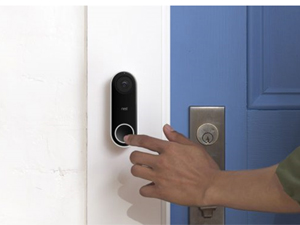



Date:22/09/17
 Home-device maker Nest Labs is adding Google's facial-recognition technology to a camera-equipped doorbell and rolling out a security system in an attempt to end its history of losses.
Home-device maker Nest Labs is adding Google's facial-recognition technology to a camera-equipped doorbell and rolling out a security system in an attempt to end its history of losses.
The products announced Wednesday expand on the internet-connected thermostats, smoke detectors and stand-alone security cameras that Nest has been selling since its inception six years ago.
Although Nest has been among the early leaders in the effort to make home appliances as intelligent as people's smartphones, it hasn't been able to make money, to the frustration of its corporate parent, Alphabet. In an attempt to shake things up, Alphabet brought in cable industry veteran Marwan Fawaz to replace Nest founder Tony Fadell as CEO after Fadell stepped down 15 months ago.
Nest had been supplementing its existing product line with slightly different choices, until Wednesday's move into entirely new categories.
The Hello doorbell comes with a built-in video camera and speakers that will make it seem like it can recognize and talk to people.
The doorbell will draw on Google's facial recognition technology, so it can warn a home's occupants when a stranger approaches. Google bought Nest for $3.2 billion in 2014 and then spun it off after it hatched Alphabet, its parent company.
Nest is now lumped into a group of risky companies venturing into new areas of technology that have collectively lost $10.6 billion in three-and-half years.
Nest isn't announcing a price for its new doorbell until it hits the market sometime during the first three months of next year.
Apple is implanting a different form of facial recognition into its $1,000 iPhone X to unlock the device, telegraphing a future where cameras increasingly are going to be able to identify people within its lens' range.
The new phone will be released in November.
Nest's usage of facial recognition hasn't yet sparked privacy concerns because it doesn't tap into Google's vast database of photos to automatically recognize people. Instead, a user of the Nest camera or doorbell must manually tag and name people before the device recognizes someone.
The Nest home security system is being billed as a simpler and more convenient way to protect a home than the alarms and other kinds of sensors that have long been sold by other vendors. Nest's "Secure" system will sell for $499 for its basic toolkit of devices.
Nest rolls out doorbell with Googles facial-recognition software
 Home-device maker Nest Labs is adding Google's facial-recognition technology to a camera-equipped doorbell and rolling out a security system in an attempt to end its history of losses.
Home-device maker Nest Labs is adding Google's facial-recognition technology to a camera-equipped doorbell and rolling out a security system in an attempt to end its history of losses.The products announced Wednesday expand on the internet-connected thermostats, smoke detectors and stand-alone security cameras that Nest has been selling since its inception six years ago.
Although Nest has been among the early leaders in the effort to make home appliances as intelligent as people's smartphones, it hasn't been able to make money, to the frustration of its corporate parent, Alphabet. In an attempt to shake things up, Alphabet brought in cable industry veteran Marwan Fawaz to replace Nest founder Tony Fadell as CEO after Fadell stepped down 15 months ago.
Nest had been supplementing its existing product line with slightly different choices, until Wednesday's move into entirely new categories.
The Hello doorbell comes with a built-in video camera and speakers that will make it seem like it can recognize and talk to people.
The doorbell will draw on Google's facial recognition technology, so it can warn a home's occupants when a stranger approaches. Google bought Nest for $3.2 billion in 2014 and then spun it off after it hatched Alphabet, its parent company.
Nest is now lumped into a group of risky companies venturing into new areas of technology that have collectively lost $10.6 billion in three-and-half years.
Nest isn't announcing a price for its new doorbell until it hits the market sometime during the first three months of next year.
Apple is implanting a different form of facial recognition into its $1,000 iPhone X to unlock the device, telegraphing a future where cameras increasingly are going to be able to identify people within its lens' range.
The new phone will be released in November.
Nest's usage of facial recognition hasn't yet sparked privacy concerns because it doesn't tap into Google's vast database of photos to automatically recognize people. Instead, a user of the Nest camera or doorbell must manually tag and name people before the device recognizes someone.
The Nest home security system is being billed as a simpler and more convenient way to protect a home than the alarms and other kinds of sensors that have long been sold by other vendors. Nest's "Secure" system will sell for $499 for its basic toolkit of devices.
Views: 485
©ictnews.az. All rights reserved.Similar news
- The mobile sector continues its lead
- Facebook counted 600 million active users
- Cell phone testing laboratory is planned to be built in Azerbaijan
- Tablets and riders outfitted quickly with 3G/4G modems
- The number of digital TV channels will double to 24 units
- Tax proposal in China gets massive online feedback
- Malaysia to implement biometric system at all entry points
- Korea to build Green Technology Centre
- Cisco Poised to Help China Keep an Eye on Its Citizens
- 3G speed in Azerbaijan is higher than in UK
- Government of Canada Announces Investment in Green Innovation for Canada
- Electric cars in Azerbaijan
- Dominican Republic Govt Issues Cashless Benefits
- Spain raises €1.65bn from spectrum auction
- Camden Council boosts mobile security





















